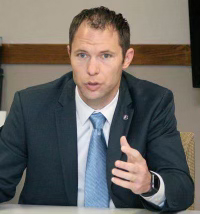 Interim update from State Rep. Chris Kassin, District 17 House
Interim update from State Rep. Chris Kassin, District 17 House
A few miles north of Burbank, on Highway 50, two identical historical markers read, “On November 25, 1935, 17 farmers from Clay and Union counties held an historic meeting at the Manning/O’Connor store in Burbank. Their purpose was to form a consumer-owned corporation which would allow the rural residents of this portion of southeastern South Dakota to provide themselves with central station electric service. At that meeting, Clay-Union Electric, the first rural electric cooperative in South Dakota, was formed.”
As I’ve shared, the legislature’s work is more comprehensive than the time in Pierre in January and February. Our interim time focuses on having more in-depth discussions, reviewing progress on projects, and getting the opportunity to see and hear firsthand about industries and initiatives serving South Dakota’s people. During the past month, I’ve had the chance to learn more about one of our state’s most essential tools in our economic development — our rural electric cooperatives.
When those 17 farmers got together in 1935, 90% of our rural homes and farms didn’t have electricity. In May 1935, President Franklin Roosevelt signed an Executive Order establishing the Rural Electrification Administration (REA), a lending program from the federal government designed to “spark” development for rural communities, and it was the farmer-based cooperatives that made rural electrification a reality.
For most of us, the idea of not having electricity is only something we deal with for only a few hours if the lines go down. The idea of trying to earn a living, educate our children, and have access to health care or other services without electricity is beyond our experience — thankfully — due to our electric co-ops.
Reliable power is the cornerstone of rural development, contributing to economic growth, improved living conditions, and the integration of rural communities into the broader national economy.
This month, I joined other friends and neighbors to celebrate the grand opening of the new headquarters for the Union County Electric Cooperative in Elk Point. In operation for more than 86 years, it can be easy to take for granted all the electric co-ops have done for our communities. They’ve been the crucial key to rural economic development. The member-owned cooperatives invest in our communities by supporting local small businesses, first responders and emergency services, and education.
Our co-ops and the REA efforts on behalf of the community continued after initial electrification. They’ve continued to provide support to ensure reliable power for rural communities. The REA and local co-ops stay current in a volatile and ever-changing market. They are committed to ensuring their communities benefit from ongoing advancements in the energy sector. They play an essential role in rural communities, providing reliable energy, fostering local development, and empowering members to have a voice in their energy provider.
The history of service provided by the co-ops is a testament to the power of private partnerships and cooperative efforts to improve the quality of life for millions of Americans in rural regions by providing them with access to electricity.
As our focus now turns to the 2024 legislative session, any ideas, thoughts, or concerns can be the foundation for future legislation. Please know that I’m listening. My email address is [email protected], or you can always call/text me at (605) 670-9698.
Thank you again for the opportunity to represent you.
Sources: The Historical Marker Database; National Rural Electric Cooperative Association

This is a relatively new slant for the Republican Party. From its proposal in the 1930’s as part of the New Deal, until well into the 1970’s, the Party in South Dakota has vehemently opposed the REA, calling it “Socialist”, among other things. It opposed the idea of “public electrical power” and supported the monopoly of private sector energy companies even though those companies did not have an interest, or the resources, to string electric lines across miles of farmland to get to isolated rural customers. I didn’t understand the Party’s position then, and am pleased we are now supporting power cooperatives.
Does he want to run the rea in SD?